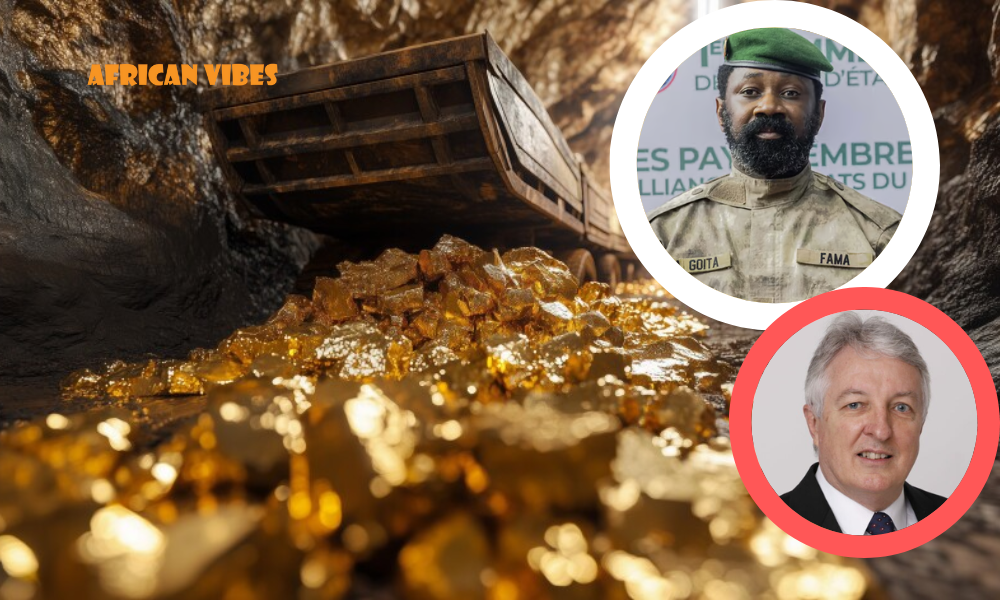Mali Takes A Controversial Stand Against Australia’s Resolute Mining And Wins Big

In a dramatic showdown that’s shaking up Africa’s mining sector, Mali’s military government has sent a clear message: the era of unchecked foreign exploitation is over. The high-stakes detention of Resolute Mining’s CEO and two top executives, coupled with a jaw-dropping $160 million settlement, marks a turning point in how the country manages its mineral wealth—and it’s got the world watching.
A High-Stakes Showdown
On November 8, 2024, the CEO of Resolute Mining, Terence Holohan, along with two senior staff members, were detained in Bamako after a meeting with Malian officials. The Malian government had summoned these executives to discuss allegations of tax evasion and financial discrepancies that the government deemed unacceptable. The Malian authorities accused Resolute Mining of underreporting revenues while claiming losses that did not align with market trends.

ALSO READ: Niger, Mali, and Burkina Faso Exit ECOWAS And Here’s Why
This bold move was not just about one company; it was a statement against decades of exploitation by foreign firms that have profited immensely from Mali’s resources while leaving the country in poverty. As the world’s fourth-largest gold producer, Mali is rich in minerals yet has struggled to translate this wealth into tangible benefits for its citizens.
The $160 Million Power Play
After more than a week of negotiations and growing international scrutiny, Resolute Mining agreed to pay $160 million to the Malian government. The payment will be made in two installments: $80 million immediately from existing cash reserves and another $80 million in the coming months. This settlement comes as part of a broader strategy by the Malian government to reclaim control over its mineral wealth.
The implications of this payment are profound. It reflects not only the immediate financial needs of the Malian government but also its determination to shift the narrative around resource extraction. The Malian government aims to build a self-sufficient economy that relies less on foreign aid and more on its abundant natural resources.
ALSO READ: DISCUSSION: Mali And France Relationship Hits New Low. Is France Sabotaging Its Former Colonies?
A New Era of Resource Nationalism
Mali’s military government has been increasingly assertive in its dealings with foreign mining companies. In August 2023, it enacted a new mining code that allows the state to claim up to 35% ownership in new mining ventures—a significant increase from the previous 20%. This shift is part of a broader strategy to ensure that Malians benefit more directly from their country’s wealth.
President General Assimi Goïta, Mali’s interim leader since a coup in 2020, has made it clear that the days of unchecked foreign exploitation are over. The Malian government’s actions are indicative of a growing trend across Africa, where nations are beginning to demand greater equity and accountability from multinational corporations.
ALSO READ: Namibia’s Ban on Exporting Unprocessed Minerals: A Catalyst for Economic Growth
The Ripple Effect
Resolute Mining’s capitulation is more than just a one-off incident; it’s a harbinger of change in Africa’s mining sector. Mali, Africa’s third-largest gold producer, is leading a charge that could reshape how the continent deals with its vast mineral wealth. The Malian government’s aggressive stance has already affected other mining giants.
Barrick Gold, the world’s second-largest gold producer, is in discussions for a “mutually acceptable outcome” regarding its Loulo mine permit. Meanwhile, Allied Gold Corp. and B2Gold Corp. have recently inked new agreements with Mali, paying $116 million and $204 million respectively for the privilege of continued operations.
A Historical Comeback

Mali is not just another African nation; it was once home to Mansa Musa, who is often regarded as one of the richest individuals in history. His legendary pilgrimage to Mecca in 1324 showcased Mali’s immense wealth in gold. Yet today, despite being rich in natural resources like gold, uranium, and lithium, Mali is often labeled as “poor”.
This paradox can be traced back to colonial legacies, foreign interference and ongoing neocolonial trade relationships with Western powers. For decades, France has positioned itself as a benefactor to Mali while failing to deliver substantial improvements in living standards or economic stability. The Malian government’s current efforts aim to break this cycle of dependency and exploitation.
The Risks of Rocking the Boat
Resolute Mining’s stock plummeted 14% following the news of the settlement, a stark reminder of the market’s sensitivity to such bold governmental actions. Shaking up the status quo comes with risks. Analysts warn that Mali’s tough stance could scare off investors, potentially stalling local jobs and economic growth.
Global implications are huge. If Mali succeeds in this resource revolution, other African nations—like Niger and Burkina Faso—might follow suit. With Africa sitting on some of the world’s most sought-after minerals, the stakes are high for both governments and global mining giants.
As other African nations watch Mali’s moves with interest, they’ll need to weigh the potential benefits of increased resource control against the risks of alienating international partners.
A Turning Point for Mali
As the dust settles on this latest mining dispute, one thing is clear: the landscape of African mining is changing. Mali’s actions could inspire a domino effect across the continent, leading to a fundamental shift in how African nations manage their natural resources.
For mining companies, the message is clear: adapt or face the consequences. The era of easy access to Africa’s mineral wealth is ending, replaced by a new paradigm where African governments demand a larger slice of the pie.

Will this bold strategy yield long-term benefits for its citizens? Only time will tell if Mali can transform its rich natural resources into sustainable development rather than continued dependency on foreign aid.
As for Terry Holohan and his colleagues? They’re probably looking forward to a quiet flight back to Australia, where the biggest threat to mining operations is the occasional cantankerous kangaroo. But make no mistake – the tremors from Mali’s bold move will be felt in mining boardrooms around the world for years to come.
For now, one thing is certain: Mali is no longer willing to accept exploitation without recourse. As it draws on its historical legacy of wealth and power, this West African nation is poised to reclaim its rightful place on the global stage—one gold bar at a time.







Responses